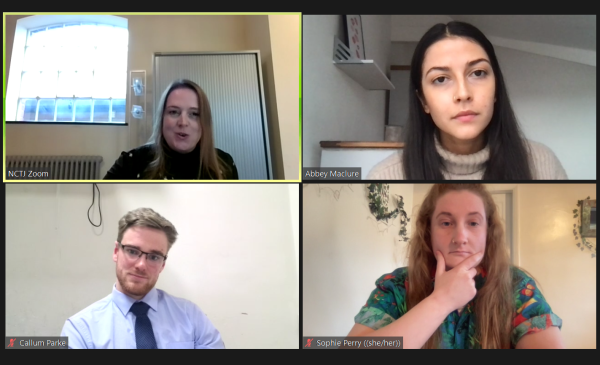Journalists issue advice to NCTJ students to ‘control the controllable’ when dealing with online abuse
 “You’re not going to write stories that everyone is going to agree with and that’s ok.”
“You’re not going to write stories that everyone is going to agree with and that’s ok.”
This was the advice given to students on NCTJ-accredited courses when they met with journalists on a panel discussing safety and resilience in journalism, hosted by the NCTJ’s Journalism Skills Academy.
Abbey Maclure, Callum Parke and Sophie Perry, who are all journalists in the early stages of their careers and have all completed their NCTJ training, met with students for a lunchtime discussion today.
The event shined a spotlight on the increasing risks in the profession, particularly when it comes to your presence online as a journalist, and the profound effect that can have on an individual’s mental health and wellbeing.
The panellists spoke about their experiences of online abuse and what to do when you encounter persistent trolling.
Abbey Maclure, senior reporter and lifestyle specialist at the Yorkshire Evening Post, gave her advice on how to remain mentally resilient and said: “Just know that it’s not about you, it’s just trolls wanting to have a go.
“You need to have that really strong awareness that you have got that job for a reason and those comments are just background noise. It’s not a reflection of you or your work.”
Sophie Perry, a reporter for Pink News, advised students not to engage with trolls in any way, shape or form.
She said: “You are never going to win an argument and the big thing is not to give them that argument.
“If you don’t respond then they move onto the next thing and they forget about you, but if you respond then it never ends and that’s not good for your mental health either.”
Callum Parke, East Midlands reporter for PA Media, said: “All you can do is make sure that your copy is accurate, that you have followed all the relevant guidelines and codes and your analysis of the data is right.
“Proof read the typos. Control the controllable. You can’t necessarily control the reaction to the story – good or bad – and if something does need to be done then that’s not something you need to control either. That’s when you need to bring in colleagues.”
The panel also discussed who to turn to when you experience abuse online, and who is out there who can help.
Abbey said that it is the responsibility of editors to “break down the barriers” in the newsroom so that trainee journalists know they can turn to them.
She said: “Often I will share with our trainees that something has affected me and I share it with them so they know it’s fine to come to me too.”
Callum, who previously worked at the Derbyshire Telegraph and had been appointed a Reach online safety representative before he joined PA, said his role had been to educate colleagues on how to stay safe online and to ensure a structure is in place for employees to report any issues or concerns to their employer.
He added: “I don’t think I’ve ever seen people close ranks like journalists do.
“If a journalist is in trouble or needs support then colleagues will get around them very quickly. We are in a unique and challenging profession and you have got to be a journalist to understand the pressures and ups and downs that come with the job.”
The panellists also discussed the challenges created by hybrid working or working from home when it comes to connecting with colleagues and sharing experiences of abuse.
As a final piece of advice to students, Sophie said: “Don’t be put off journalism by the things we have said because abuse and trolling makes up a small percentage of the engagement you will get.
“It’s just a matter of being prepared for it when it happens and putting steps in place – focus on yourself and be proud of the work you are doing.
“If your editor says you are doing a good job then it doesn’t matter what anyone else says.”
Laura Adams, head of the NCTJ’s Journalism Skills Academy, said: “Thanks to Abbey, Callum and Sophie for a lively session which provided important insight into the realities of online safety and mental health and wellbeing. Safety and resilience remains an important topic across the industry and we hope student journalists feel more knowledgeable as they begin their careers.”

